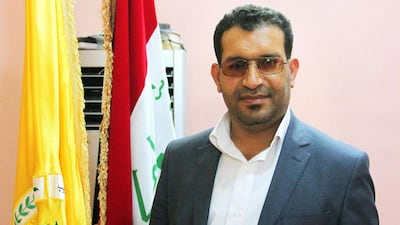BAGHDAD // An Iraqi Shiite who proudly fought Sunni rebels in Syria’s civil war is now running for parliament in his home country, where the conflict has raised already-high sectarian tensions.
Faleh Al Khazali is one of an unknown number of Iraqi Shiites who have gone to fight on the side of Syrian President Bashar Al Assad against a Sunni-led rebellion.
There are Iraqi Sunnis fighting on the other side of the war, including for the Islamic State of Iraq and the Levant (ISIL), one of two powerful jihadist groups in Syria with roots in Iraq.
The civil war has destroyed swathes of Syrian cities and claimed over 150,000 lives, and in Iraq has sharpened sectarian tensions that have contributed to the worst surge in bloodshed since the height of the violence that followed the 2003 US-led invasion.
Mr Al Khazali, a 39-year-old father of four, commanded the first group of Iraqi Shiite forces that travelled to Syria “to free the area surrounding the Sayida Zainab (shrine) from the takfiris,” he said in the southern port city of Basra, referring to Sunni extremists.
The shrine to the daughter of Imam Ali, located near Damascus, is a revered site for Shiite Muslims, which Iraqis who go to Syria say they are fighting to defend.
“We entered Syria a year and three months ago ... in a pre-emptive war to eradicate” the extremists, said Mr Al Khazali, who is running on prime minister Nouri Al Maliki’s State of Law list in the April 30 parliamentary election.
Iraq’s Shiite-led government has publicly sought to remain neutral, but privately seems to favour Mr Al Assad, who is a member of the Alawite sect, an offshoot of Shiite Islam.
“I was wounded in my eye in front of Sayida Zainab and lost it, and I am delighted and proud of this, and I will return to Syria as the situation requires,” Mr Al Khazali said.
Mr Al Khazali, a government employee, was also wounded in his right leg while fighting in Syria.
His public Facebook page makes no secret of his involvement in Syria, featuring pictures of him clad in camouflage, including one slightly blurred shot that appears to show him holding a Kalashnikov assault rifle in each hand.
Other pictures include a montage of the Sayida Zainab shrine, Mr Al Khazali in battle dress giving a victory sign, and a campaign poster with pictures of him and Mr Al Maliki and the slogan: “We build Iraq.”
He is also shown lying in a hospital bed with a bandage over his right eye.
“Our national security, as Iraqis, requires that we go there (to Syria) to defend the holy places first, and second to defend Iraq,” Mr Al Khazali said.
The Syrian civil broke out in 2011 when Mr Al Assad’s forces carried out a bloody crackdown on protesters calling for reform.
Foreign fighters from various Arab states and as far afield as Afghanistan and Chechnya have played a key role in the Syrian conflict, first on behalf of the rebels, but also on the side of the regime.
Lebanese Shiite militant group Hizbollah has acknowledged sending thousands of fighters into Syria and contributing to a string of regime victories.
“There are hundreds of offices belonging to Shiite movements in all Iraq that welcome recruits to fight in Syria,” Abu Ammar, who has twice been to Syria to fight on the side of Assad’s regime, each time for several weeks, said in Baghdad.
“I am ready to go again at the first chance,” he said.
“The first time there were many Iraqis and Syrians with me. We fought the ISIL organisation and expelled them from areas near the Sayida Zainab shrine.”
He said he fought ISIL during his second trip as well, but did not specify where.
Pictures of Iraqi Shiites killed in Syria hang around Baghdad, while Islamist militant forums feature images of Iraqi Sunnis who died fighting for groups including ISIL.
In Najaf, south of Baghdad, a steady stream of Iraqi Shiites killed in Syria are buried in the massive cemetery known as “the Valley of Peace” that surrounds the shrine of Imam Ali, one of the holiest sites for Shiite Muslims.
A special area has been allocated for the burial of “the martyrs who fought to defend the Sayida Zainab shrine,” said Mahdi Al Assadi, who runs a burial service in the cemetery.
“Between 10 to 15 martyrs a week (are buried in) the Najaf cemetery,” Mr Al Assadi said.
* Agence France-Presse

